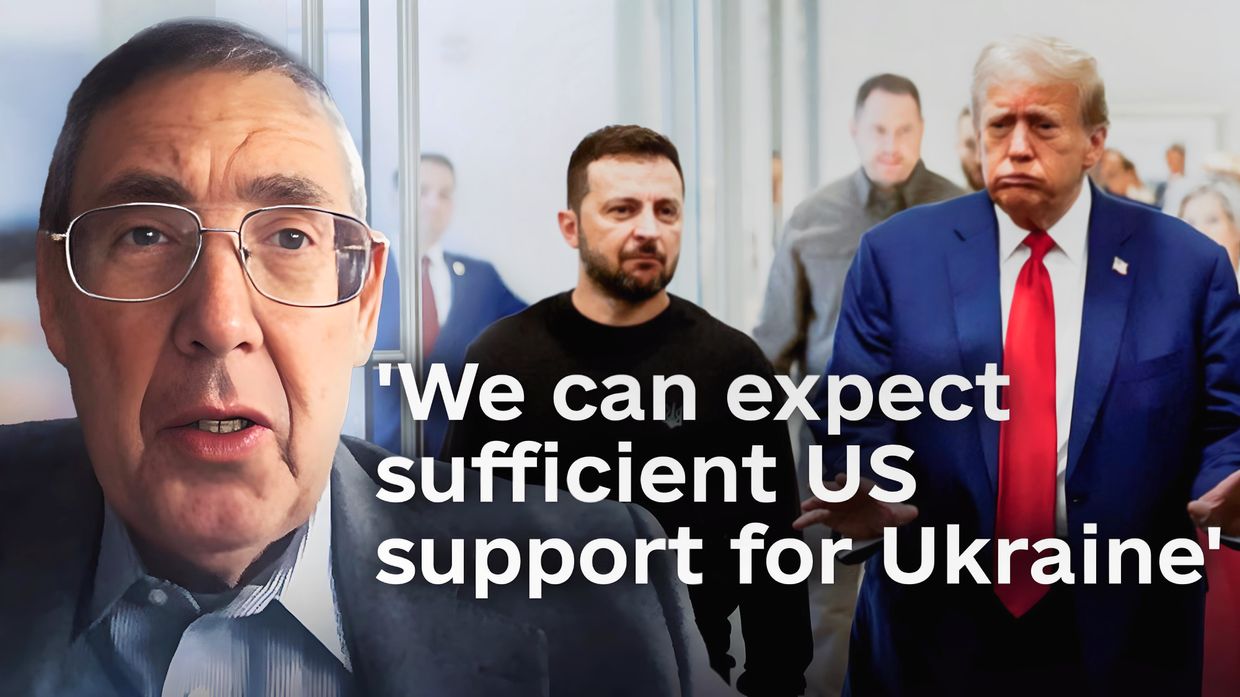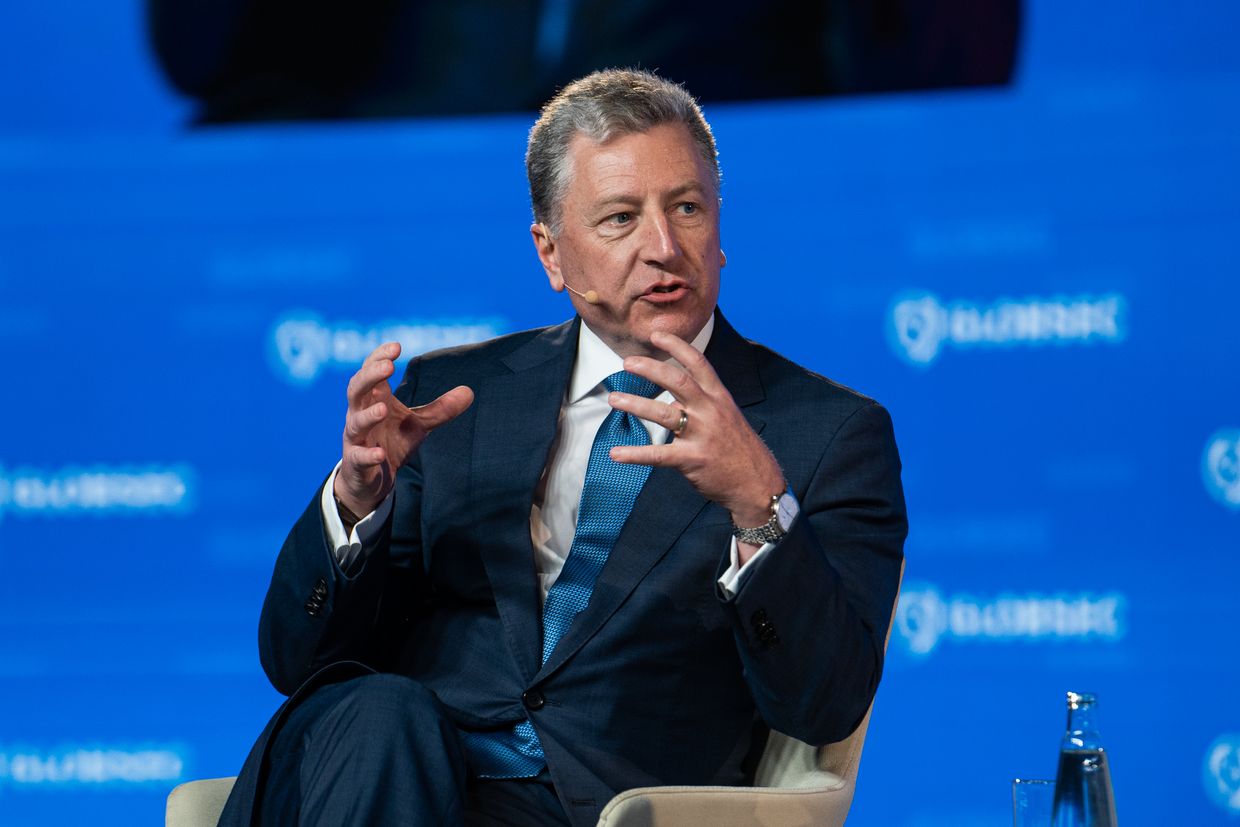Ukraine aid key to battling Russian invasion — Can Europe fill the gap if Trump pulls the plug?
EU aid for Ukraine faces economic, political and technical hurdles

Behind bulletproof glass, former US President and Republican presidential candidate Donald Trump arrives to speak during a campaign rally at Gastonia Municipal Airport in Gastonia, North Carolina, US on Nov. 2, 2024. (Peter Zay / AFP via Getty Images)
Amid rising fears of U.S. aid being cut off under a second Donald Trump presidency, Ukrainians are left wondering whether Europe can rise to the challenge and fill the gap.
Trump has promised to swiftly end Russia's war against Ukraine, speaking highly of Russian President Vladimir Putin and making unflattering comments about his Ukrainian counterpart.
Fears that Ukraine's top Western ally could pull the plug on aid that is key to fending off Russia's full-scale invasion, now in its third year, swelled this past weekend when those close to the president-elect made a few jabs at Ukraine and its president.
Donald Trump Jr., the increasingly influential son of the president-elect, has publicly stated his opposition to Ukraine's right to use Western-provided weapons to hit targets inside Russia.
"The Military Industrial Complex seems to want to make sure they get World War III going before my father has a chance to create peace and save lives," Trump Jr. wrote on X on Nov. 17, commenting on reports that outgoing President Joe Biden had authorized the use of U.S.-made ATACMS against targets inside Russia.
As the decision came in the last months of Biden's term in office, it remains unclear whether Trump will uphold the policy after he returns to the White House.

And while Ukraine has a number of influential allies in Europe that would have the power to pick up where the U.S. might leave, doing so in the upcoming year would be a near-impossible task.
"Trump's victory could scarcely have come at a worse time," Nick Witney, a security expert at the European Council on Foreign Relations, told the Kyiv Independent.
"Most European governments are in economic or political difficulties, or both."
Wake-up call for Europe's defense industry
Russia's full-scale invasion of Ukraine in 2022 was a wake-up call for Europe.
Since then, Europe's defense industry has increased its ammunition production capacity by 50%. It aims to produce over 2 million shells per year by the end of 2025 — double its capacity in February 2022, according to the European Council of Foreign Relations.
Stefan Wolff, professor of international security at the University of Birmingham, said that "the EU defense industrial base has improved and will continue to improve, not least because it is now possible to allocate structural/cohesion funding to security projects within the EU."
"This will not benefit Ukraine directly, but it will likely mean more investment into defense capacity in general," he told the Kyiv Independent.
"This could then also benefit Ukraine but again not necessarily in the timeframe dictated by events in the U.S."
Fabian Hoffmann, a defense policy expert at the University of Oslo's Oslo Nuclear Project, agreed that "Europe has significantly ramped up production of some capabilities, such as 155mm artillery shells and other types of ammunition."
"In these areas, Europe could compensate relatively well, although the absence of U.S. assistance would, of course, still be felt," he told the Kyiv Independent.
But Hoffmann argued that, compared with the U.S., Europe does not have some crucial types of weapons needed by Ukraine.
He said that the "U.S. maintains a large reserve arsenal of tanks and infantry fighting vehicles that could be made available to Ukraine, whereas Europe lacks such reserves."
The U.S. also has about 2,000 AGM-158A JASSM cruise missiles and another 2,000+ AGM-158B JASSM-ER cruise missiles in its arsenal, while "European states do not have anywhere near that number of cruise missiles," he added.
Moreover, the U.S. is "the sole producer of interceptors for Patriot and NASAMS air defense systems," he said.
"If the U.S. were to withdraw as a supplier, Ukraine would face severe challenges in missile defense, particularly against ballistic missile threats," Hoffmann added.
Europe producing more weaponry, but it's not enough
Even with increased production of weapons that Europe can offer without U.S. oversight, the deliveries have not been large enough to meet Ukraine's needs, analysts say.
Pavel Havlicek, an expert on Russia and Ukraine at the Czech Republic's Association of International Affairs, argued that "over the past two and half years, the EU proved very slow, even somehow lenient, to expand military production, massively increase military spending and investments, or boost its military industry."
"If you ask me if the EU can overnight replace the role of the U.S., it is absolutely no — since the American backing is multilayered and strategic, including the air protection — Patriot (air defense systems), mid- and long-range missiles that operate on the U.S. tech, including with their precision or intelligence gathering, which is key with limited resources at the battlefield," he told the Kyiv Independent.

Lucian Kim, senior analyst for Ukraine at the International Crisis Group, also said that Europe would not be able to fill the gap because "Europe's militaries — Germany's in particular — are themselves under-armed, and Western allies lack both the stocks and production capacity to match the assistance Ukraine has been receiving from the U.S."
He cited problems with the Czech-led initiative to supply artillery shells to Ukraine.
The initiative, which was announced in early 2024, aims to deliver 1 million shells to Ukraine by the end of this year but it has faced delays.
The European Union's chief diplomat, Josep Borrell, announced on Nov. 11 that the bloc had delivered 980,000 artillery shells to Ukraine out of the 1 million promised. He explained the shortfall, citing unexpected production capacity limits.
Samantha de Bendern, an associate fellow at the Royal Institute of International Affairs at Chatham House, agreed that the EU was unlikely to fill the gap if the U.S. pulled the plug on aid.
"While the EU and its member states have made strides in increasing military aid and production, the stark reality remains that Europe cannot yet fill the void left by the United States, either in terms of its own defense or that of Ukraine," she told the Kyiv Independent.
"As long as perceived national interests continue to diverge and political stability wavers, particularly in key countries like Germany and France, Europe will struggle to forge a unified and effective response to the war raging on its continent."
She also said that "Europe is now in a position in which it cannot defend the country that has sacrificed tens, maybe hundreds of thousands of lives to defend not only its own territory but Europe as a whole."
De Bendern said that European governments were under pressure from the electorate to spend money on health infrastructure and other public projects rather than Ukraine.
"The question for them is whether you spend money on Ukraine or build another hospital," she added.

Europe in crisis
Apart from technical limitations, there are political problems that obstruct a further increase in Europe's aid for Ukraine. These include political instability in Germany, where Chancellor Olaf Scholz' coalition has collapsed.
"Germany, Europe's largest military donor to Ukraine, has plunged into political chaos with the collapse of the Scholz-led coalition. France's Emmanuel Macron, a staunch defender of Ukraine in spite of his initial impulses to seek a dialog with (Vladimir) Putin, has lost much of his freedom of action since the parliamentary elections in June in which he lost his parliamentary majority," De Bendern said.
"Elsewhere in Europe, political parties on the far right or far left of the political spectrum with pro-Russian sympathies are rising," De Bendern added.
"Already-fragile EU unity, a stalled Franco-German motor, a Trojan Horse in the shape of (Hungarian Prime Minister Viktor) Orban holding the presidency will come under further pressure as individual states delude themselves they can build 'special relationships' with Trump, and that supporting his agenda for Ukraine would be a good way to win favor," Witney said, listing the problems the EU is facing.
When asked for a comment, a spokesperson for the European Commission referred the Kyiv Independent to a Nov. 18 statement by Borrell, who said that "we have to continue supporting Ukraine as much as we can and quicker, as quick as we can."

The U.S. and the EU currently provide 43% of military aid to Ukraine each, according to figures cited by de Bendern. In the EU, Germany is the biggest donor, with 12%.
"These figures speak for themselves: for the EU to replace the U.S., it would have to double the amount of military aid it gives to Ukraine," De Bendern said.
"The current political situation in Europe, as well as the real military capabilities of individual European countries, mean that Europe will not be able to step up in the short term."
But it all boils down to the presence of political will. If there is a will, Europe will be able to at least partially fill the gap in case of a U.S. withdrawal, according to analysts.
"There is so much more Europe can afford to do or could do creatively with some more money, including the frozen Russian assets," Sascha Bruchmann, a military analyst at the London-based International Institute for Strategic Studies, told the Kyiv Independent.
"It is the lack of political will and geopolitical naïveté, not financial weakness, that holds Europe back."
What should be done to continue helping Ukraine?
Susan Stewart, an expert at the Eastern Europe and Eurasia Division of the German Institute for International and Security Affairs, said that, although the EU may not be able to undertake some projects as a bloc, some of its member states could create a coalition to boost support.
"There could be a sort of 'coalition of the willing' of those states that see their own security as severely threatened and/or have shown unwavering support for Ukraine," she said.
"A possible beginning of this coalition may be indicated by the meetings Donald Tusk is planning with the leaders of the UK, France, and the Baltic and Nordic states. And it will certainly not hurt that Poland will take over the presidency of the EU for six months in January 2025."
Stephen Hall, lecturer in Russian and post-Soviet politics at the University of Bath, argues that supporting Ukraine is vital for Europe's survival.
"Europe has to step up for its own safety as well," he told the Kyiv Independent.
Yet it is up to the countries that understand the risks to do so, regardless of what U.S. policy will be in January.
A spokesperson for Rheinmetall, one of Germany's largest defense companies, said that it "is a strategic partner of Ukraine and intends to support the country in the long term."
"This applies regardless of the outcome of the U.S. election," he told the Kyiv Independent. "Should the countries of Europe decide to increase their support for Ukraine in the future, Rheinmetall will do everything in its power to meet these increased demands as well."
Martin Fornusek and Chris York contributed to this story.













